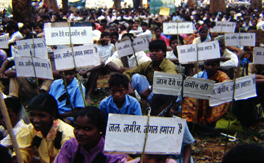The Water (Prevention and Control of Pollution) Cess (Amendment) Act, 2003
An Act further to amend the Water(Prevention and Control of Pollution) Cess Act,1977.
An Act further to amend the Water(Prevention and Control of Pollution) Cess Act,1977.
Clay bricks are produced in Rajasthan in small or cottage scale brick kilns and clamps which operate seasonally. The raw materials in the brick kilns include topsoil, coal, paddy husk, fly ash, wood &

<p>The National Green Tribunal Act 2010 approved by the President of India on June 2, 2010. It provides for establishment of National Green Tribunal- a special fast-track court for speedy disposal of environment-related civil cases.</p>
The six edition of PCL series of Central Pollution Control Board on "Pollution Control Acts, Rules and Notifications issued thereunder" is being publishing following 1989, 1992, 1994, 2001 and 2006 publications.
Order of assessment from West Bengal Pollution Control Board to SAIL, Durgapur Steel Plant dated 06.05.2010.
The National Green Tribunal Bill was considered by the Department Related Parliamentary Standing Committee on Science and Technology, Environment and Forests following which they made certain recommendations in their report dated 24th November 2009. A summary of the recommendations made and proposed to be accepted by the Ministry of Environment and Forests.

The National Green Tribunal Bill, 2009 that would judge environmental disputes.The tribunal will have the same powers as a civil court, will subsume various state-level authorities that address environmental issues as well as committees created by the Supreme Court for that purpose.
A Bill to provide for the establishment of a National Green Tribunal for the effective and expeditious disposal of cases relating to environmental protection and conservation of forests and other natural resources including enforcement of any legal right relating to environment and giving relief and compensation for damages to persons and property and for matters connected therewith or incidental
The consumers are being made to pay for the penalty levied upon Delhi Jal Board (DJB) for non-treating of sewage water. The DJB is charging three paisa per kilolitre water from the consumers. Strangely, consumer is being forced to pay for the failure of Jal Board to treat sewage water. The big question is why the consumer should pay for failure of DJB in the Capital.
Ever wondered what happens to all the waste you generate and where it goes after it is mindlessly dumped? Reports indicate that a good 99 per cent of people have never bothered or even know what happens thereafter. The responsibility of collection of waste obviously has to rest with the municipal board of the city.
Order of assessment from West Bengal Pollution Control Board to SAIL, Durgapur Steel Plant dated 11/06/2009.